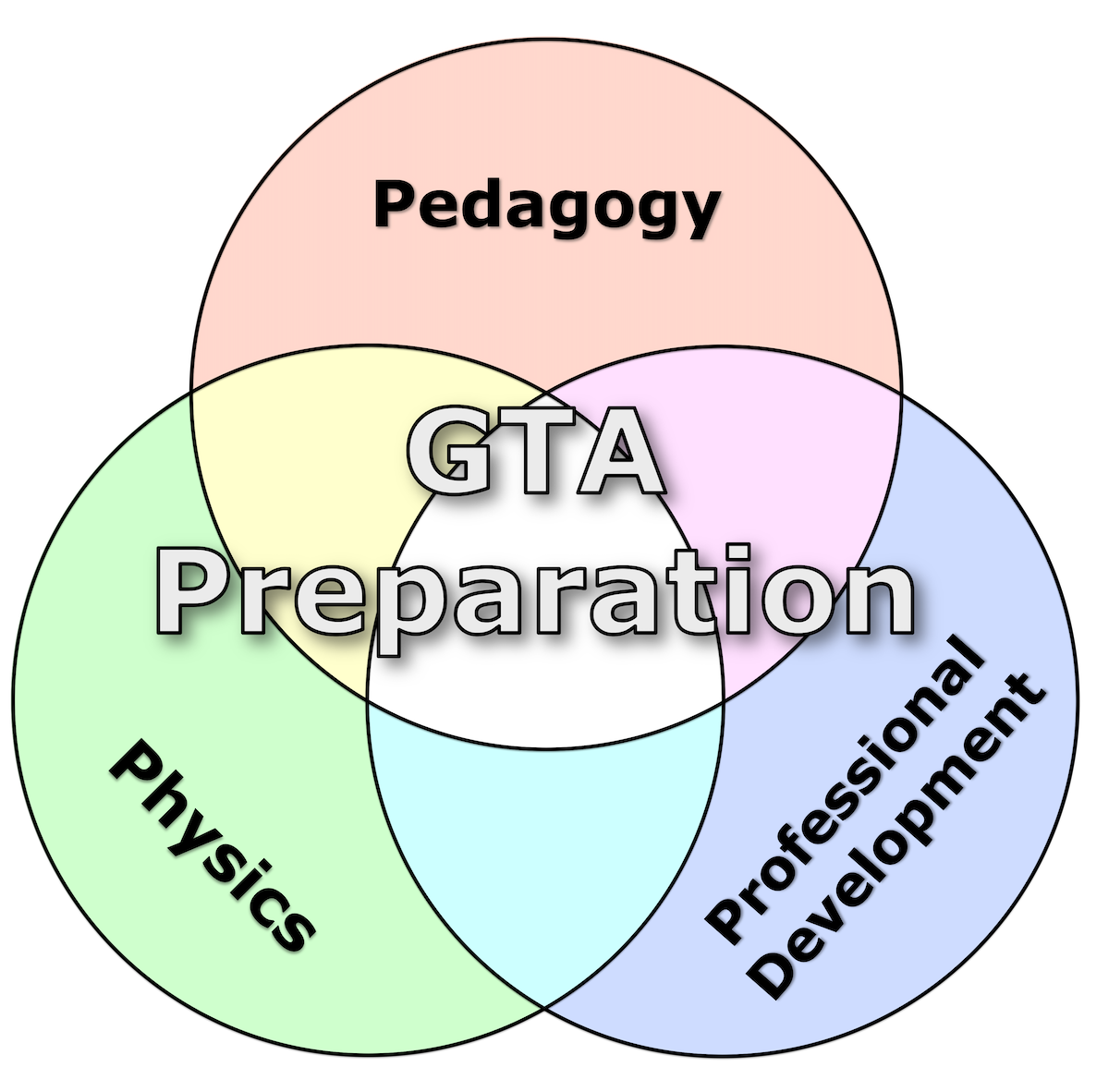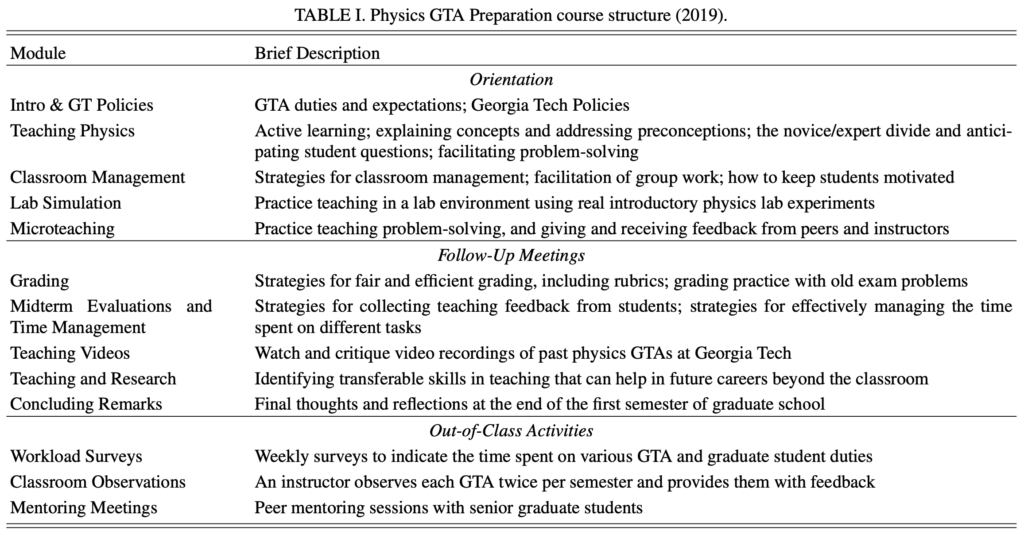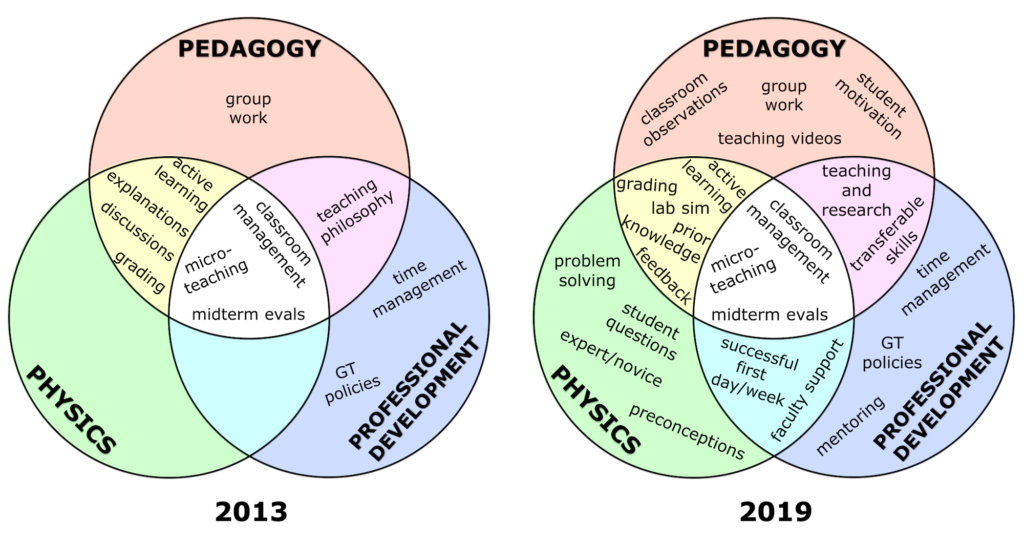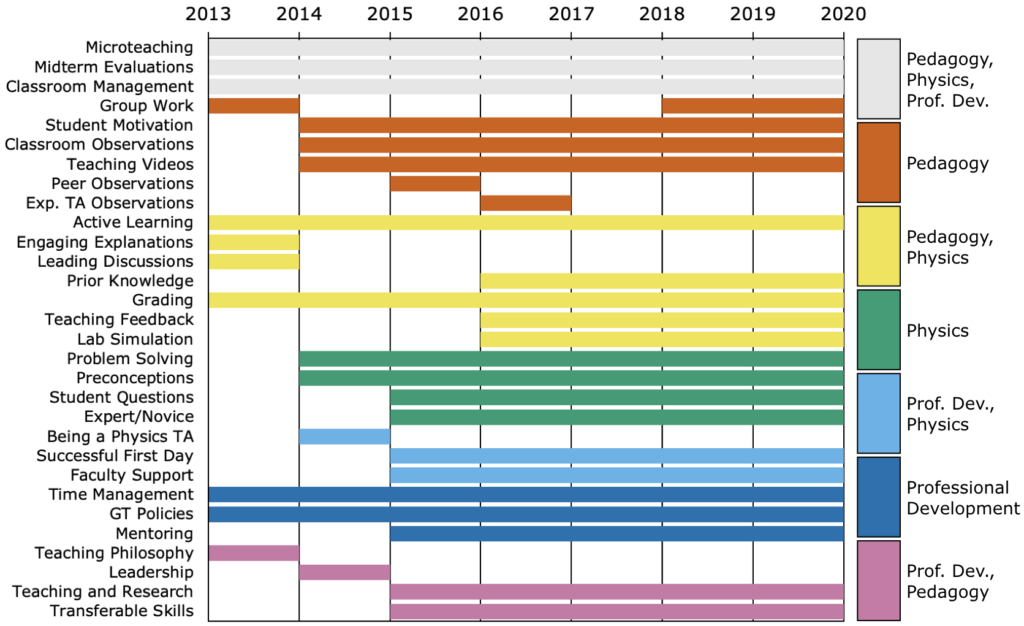Graduate Teaching Assistants (GTAs) are key partners in the education of undergraduate students. In large-enrollment intro physics classes, students spend roughly half of their in-class hours in labs and recitations under the supervision of GTAs. Since GTAs can have a large impact on their students’ learning, it is important to provide them with appropriate preparation for teaching. But GTAs are also students themselves – they have many demands on their time, and not all of them want to become professors after grad school. Therefore, it is crucial that GTA preparation not be a burden but rather be fully integrated into their professional development.
The School of Physics at Georgia Tech has been offering a GTA prep course for first-year Ph.D. students since 2013. The majority of these first-time GTAs have no prior teaching experience but consider teaching to be an important part of their professional development as physicists. Through a cycle of implementation and revision, and guided by the 3P Framework we developed (Pedagogy, Physics, Professional Development), the course has evolved into a robust and comprehensive professional development program that is well-received by physics graduate students.
We assessed the effectiveness of the course with a combination of surveys, pre/post tests, and student evaluations. We found that GTAs feel better prepared for teaching after going through the Orientation. GTAs consider most useful the course activities in which they can practice and get feedback on their teaching (“Microteaching”, “Lab Simulation”) and the lessons in which we discuss the pedagogical content knowledge necessary to teach intro physics labs and recitations (“Teaching Physics”). GTAs who participate in the GTA prep course adopt more learner-centered teaching approaches and increase their pedagogical knowledge. They also receive higher end-of-semester student evaluations than GTAs whose first teaching experience predated the establishment of the GTA prep course.
Full details can be found in Dr. Alicea’s Dissertation.
The 3P Framework
The Physics GTA Preparation course has two main goals: to produce GTAs who are motivated and effective teachers, and to help GTAs develop transferable professional skills they can use regardless of their post-grad school careers. To achieve this, the class has the following learning objectives:
- Developing and applying learner-centered teaching practices to create a valuable, student-centered, learning experience
- Explaining physics concepts, addressing students’ preconceptions, and facilitating problem solving
- Applying teaching principles to giving and receiving feedback to revise and improve their teaching practice
- Managing classroom dynamics and developing efficient ways of grading students’ work
- Reflecting on their professional identity and identifying transferable skills utilized in teaching that are useful for their future careers as professional physicists

We identified three major themes in these objectives: (1) Pedagogy, (2) Physics, and (3) Professional Development. In the process of trying to determine what themes were served by each of the course topics in the pilot semester (Fall 2013), we realized that several items could fit into one or more of the main three themes. In order to make curricular improvements we developed a method for integrating these three main themes into what we are calling the 3P Framework. This framework posits that in order to have a comprehensive program for GTA preparation that is useful and valuable for GTAs in the classroom and beyond there must be full integration between pedagogical knowledge, physics content, and professional development strategies. Pedagogy alone is not enough, because GTAs are novice instructors who need guidance in how to apply pedagogical knowledge to their physics teaching assignments. Physics alone is not enough, because just knowing the content does not guarantee skills in how to teach it. And professional development is crucial for motivation, so GTAs will see that teaching can help them achieve their professional goals even if they lie outside of academia. A key feature of the 3P Framework is that the intersections of the three P’s are just as important as the three P’s themselves. The 3P Framework can be visualized with a Venn Diagram in which each circle corresponds to one of the P’s: pedagogy, physics, professional development.
The Course
The Physics GTA Preparation course is structured in two parts: the Orientation and the Follow-Up Meetings. The Orientation comprises roughly 3/4 of the total contact hours of the class and happens before the semester begins. The Follow-Up Meetings happen every 2-3 weeks during the semester. The course also includes out-of-class work and activities such as classroom observations, workload surveys, and mentoring meetings. A detailed account of the development of the curriculum can be found in [paper submitted, link coming soon].
The following table summarizes the various modules within the Orientation, Follow-Up Meetings, and Out-of-Class Activities. For curricular materials, please visit this dropbox URL.

This figure shows the contents of the pilot semester (Fall 2013) and one of the most recent semesters (Fall 2019) mapped into the 3P framework. It can be clearly seen that the course has become more robust and comprehensive, avoiding the gaps visible in the early semesters, without increasing the contact time too much — Fall 2013 had 17 contact hours, whereas Fall 2019 had 20 contact hours.

This timeline shows the evolution of the curriculum, from Fall 2013 to Fall 2019, indicating when each topic/content was added or removed.

Please look at our publication in Phys Rev PER for the details of the development and evolution of the GTA prep curriculum.
Program Assessment
Three main research questions drove the initial program assessment:
- What elements of a formal GTA preparation program do GTAs perceive as the most useful or beneficial for their professional development?
- What effect does a formal GTA preparation program have on graduate students’ teaching self-efficacy and attitudes about teaching?
- Does a formal GTA preparation program have an effect on graduate students’ teaching effectiveness, as determined by end-of-semester student evaluations?
There are several assessment points before, during, and after the semester. For the purposes of this initial assessment, we focused on the ones listed in the following timeline graphic. [paper in preparation] details these assessments and their results.

